General Metal and Holloware
 |
Orme Evans & Co. Ltd.
Elgin Works, Great Brickkiln Street |
 |
The company was certainly well established, and making a wide range
of goods in a wide range of materials and finishes, when, in 1902, John
Marston sold to them his tinsmithing, enamelling and japanning business.
This was situated at Jeddo Works in Jeddo Street. It had been
Marston's original business, bought by him when Edward Perry (of Richard
Perry Son & Co) died in 1871. He sold the firm, but not its
premises, to Orme Evans in order to concentrate on the manufacture of
bicycles. Marston, of course, retained his "Sunbeam" trade mark;
Orme Evans may already have been using "Prince of Wares".
At this time Marston had been making domestic wares in brass and
copper though not, to judge by surviving examples, on a large scale.
Brass and copperwares by Orme Evans are also known. It may be that
this production pre-dates the acquisition of Marston's business or it
may be that Orme Evans took up this sort of work on making the
acquisition.
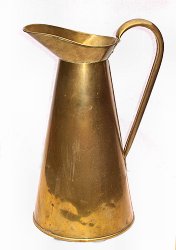 |
This large (6 pints) brass
ewer was made by Orme Evans, possibly around the turn of the
century. Many other companies made such ewers and there is
not much, apart from the exact shape of the handle, to
distinguish one from another. |
| By this time many makers
were marking their goods. This is the mark on the base of
the ewer shown above. It consists of the letters O, E and
Co with an ampersand. The 6 beneath it shows the capacity
of the ewer in pints. Orme Evans' enamelled wares seem not
to have been marked and were probably sold with a paper label
stuck on. |
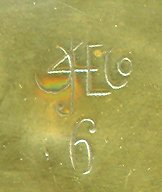 |
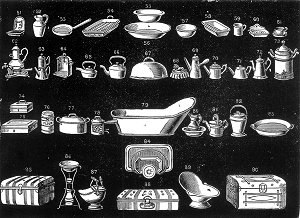 |
This illustration, from an
advert of 1906, illustrates at least the main range of their
products - domestic wares and trunks.
Some of the items
could have been made in copper or brass but it is not evident
whether they were or not. |
| A hot water plate, stamped underneath with Orme
Evans' usual mark but in a circle with "Made in England" around
it; and the word "copper".
The copper had been silvered
but most of this has now worn away. |
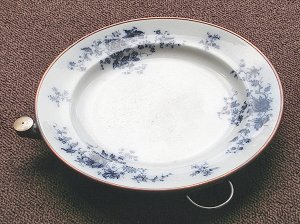 |
|
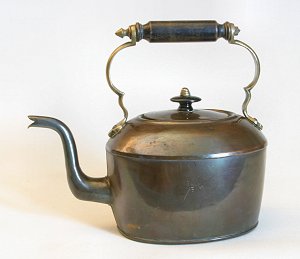 |
A copper kettle, with brass and ebonised wood
handle, marked with Orme Evans' usual mark. Photo by
courtesy of Vin Callcut. |
| This object is clearly marked on the base and
appears to be in its original state. It appears to be a
ewer but the top has four pouring lips.
The top of the
handle appears to have been flattened to accommodate this
peculiarity.
The body has a sort of random texture
embossed on it, along with three encircling bands and a row of
roundels. |
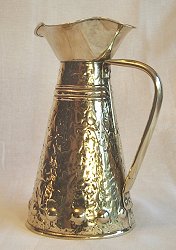 |
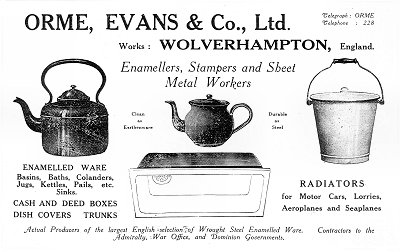 |
This advertisement appeared in 1920 and seems to cover the
usual range but there is no mention of enamelled advertising
signs. But they now claim to make radiators for cars, lorries,
aeroplanes and seaplanes. |
| This advertisement from 1932 shows the Prince
of Wares trade mark - a type of Nordic blue-eyed blond that was
shortly to achieve notoriety. Note too that the advert
says "We use only English steel, English enamel and English
labour", and bear in mind the number of Irish and Welsh living
in Wolverhampton at the time. Every page of their
catalogue, detailed below, has, across the top, the words "Best
Wolverhampton Quality". It all seems part of a
jingoism which is a little uncomfortable to-day.
Note that
the advert refers to tinned steel and stainless steel but mainly
to enamel ware, which may suggest a greater concentration of
business than appeared in 1899. Stainless steel seems to
have been added to the repertoire. |
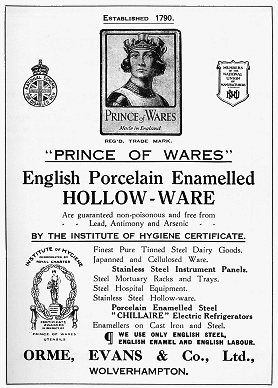 |
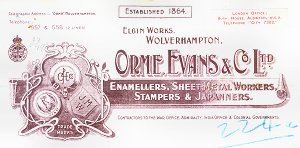 |
This letterhead,
dated 1924, shows three trade marks. The centre
top one is the letters O E & Co; that on the left is the
phoenix mark of Henry Fearncombe & Co; and that on the
right might just stand for John Marston, Wolverhampton.
Orme Evans had taken over the japanning and enamelling
businesses of both in 1902. |
| But their catalogue, dated May 1927, from which our
illustrations on another page are taken, is redolent of its age, still
largely Victorian and quite different in many respects from the world
that was ushered in by the Second World War. Most of Orme Evans'
products in this catalogue were for domestic use, though they also have
a large section on "Dairy Accessories". There is no brass and
copperware in the catalogue. |
| An enamelled storage
bin with a Prince of Wares label. Enamelled items
have been seen with an acid etched mark on the base but
it seems that the company's products of this sort were
not usually marked other than by the use of these stuck
on labels. |
 |
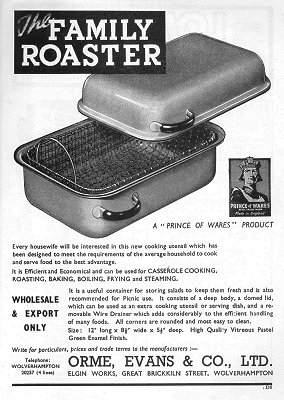 |
This advertisement
seems to come from the 1950s and shows the company still
making domestic wares with vitreous enamel finish. |
| According to Compton Mackenzie's history of Brockhouse,
they took over Orme Evans sometime during the Second World War.
Brockhouse had become a large conglomerate and it seems that Orme Evans
continued, with its own identity maintained, within that organisation.
The company has been noted as listed in the 1959-60 Red Book but it is
missing from the 1961 edition. But exactly why and when it closed or, at
least, lost its separate identity, is not known. |
 |
|
 |
|
 |
Return to the
previous page |
|
Return to the
list of companies |
|
View the
1927 catalogue |
|
|














